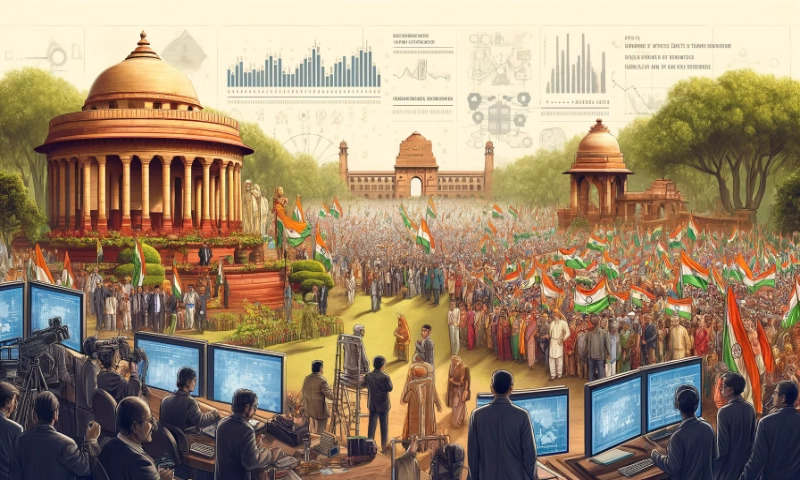Navigating India’s 2024 Election Landscape: Assessing Market Scenarios

As India approaches its 2024 general elections, market sentiment is charged with anticipation and speculation. Majority of exit polls on Saturday, anticipated a continuation of the National Democratic Alliance (NDA) government under Prime Minister Narendra Modi. However, recent developments have introduced an element of uncertainty, casting shadows over the electoral landscape. In the lead-up to the elections, opinion polls predicted significant seat gains for the Bharatiya Janata Party (BJP). Nevertheless, the first five phases of the election have revealed less clear progress. Lower voter participation and potential voter share losses in key states such as Maharashtra, West Bengal, Karnataka, and Bihar due to regional uncertainties have cast doubts on the NDA’s ability to secure a third term. Let’s study what holds for the market by understanding scenarios of who will form the Government at the centre.
The Role of Coalitions
Historically, alliances have played a pivotal role in government formation, shaping the trajectory of Indian politics. While the BJP’s dominance as a single party has somewhat overshadowed the influence of coalitions, the emergence of the INDIA coalition adds a layer of complexity to the electoral calculus. This new coalition hints at potential shifts in power dynamics, challenging the BJP’s previously unassailable position.
Potential Scenarios and Market Impact
A nuanced analysis of four potential scenarios sheds light on the varied market reactions:
1. Scenario 1 – BJP Retains Single-Party Majority: In this scenario, markets are poised for continuity and confidence in policy stability. Expectations of further reforms buoy investor sentiment, potentially driving market upswings and fostering a positive outlook.
2. Scenario 2 – BJP Forms Government with NDA Majority: While still favorable, this outcome might signal a slightly cautious approach due to potential delays in fiscal consolidation. However, overall macro stability is expected to endure, mitigating downside risks and providing a semblance of stability amidst political flux.
3. Scenario 3 – Hung Parliament: Market uncertainty looms large in this scenario, with the possibility of abrupt policy shifts and reform reversals. The lack of a clear mandate introduces ambiguity, leading to volatile swings in investor sentiment and triggering short-term market turbulence.
4. Scenario 4 – Change in Government to INDIA Coalition: A shift in power brings forth heightened uncertainty, potentially leading to policy reversals and market jitters. The transition could unsettle investor confidence, prompting knee-jerk reactions and fostering an atmosphere of uncertainty in financial markets.
Since 1991, Indian elections have significantly influenced economic policies, sparking keen interest from stock market players. The dominance of the Congress and BJP parties, except for brief periods, has shaped market behavior. In 1991, despite uncertainties surrounding Rajiv Gandhi’s assassination, markets rallied before the results, anticipating a stable government. Subsequent elections saw varied market reactions, ranging from optimism to shocks. In 2004, despite expectations of an NDA victory, the Congress emerged as the winner, causing a 16% market drop. Similarly, 2009 witnessed market surprise with the Congress’s triumph. Conversely, the 2014 and 2019 elections saw market confidence in the BJP’s victory, reflected in steady market trends and record-breaking performances. Presently, anticipations favor the BJP’s success in the 2024 elections, yet market volatility suggests caution, hinting at potential surprises on June 4th.
As markets brace for the election outcome, Scenario 1 appears to be the frontrunner in investors’ minds, fostering optimism for policy continuity and market growth. However, any deviation from expectations could trigger short-term turbulence, impacting business sentiment and investor confidence. Nonetheless, India’s resilience and adaptability have historically steered markets back on course, underscoring the nation’s long-term growth prospects amidst political uncertainty. As we await the final results, it remains crucial for investors to stay informed and prepared for any potential shifts in the market landscape.
Trending Blogs: Invest in Small Cap & Mid Cap Mutual Fund & Stocks | Companies affected by Rise in Crude Oil Price | Fall in IT Stocks | Launch of 4 New Indices | Revised Lot Size of Nifty Contracts | ITC Share Surge After BATs Block Deal | Impact of RBI Circular on Currency Trading | RBI’s New Lending Guidelines | Electric Air Taxis in India
Related Articles:
Stock Market at new all-time high | Stocks to Watch if BJP Wins 2024 Lok Sabha Elections | Impact of BJPs Seat Wins on the Stock Market | How to Open a Demat Account Without a Broker | Factors to Keep in Mind While Opening a Demat account | Factors to Consider When Opening a Demat Account
Popular Stocks: ICICI Bank Share Price | HDFC Bank Share Price | CDSL Share Price | UPL Share Price | TCS Share Price | BHEL Share Price | Trident Share Price | IRFC Share Price | Adani Power Share Price




